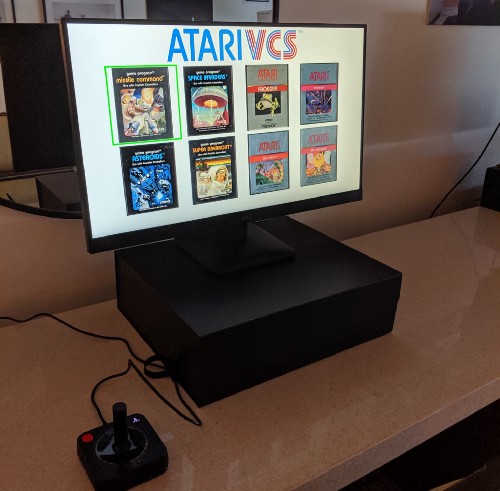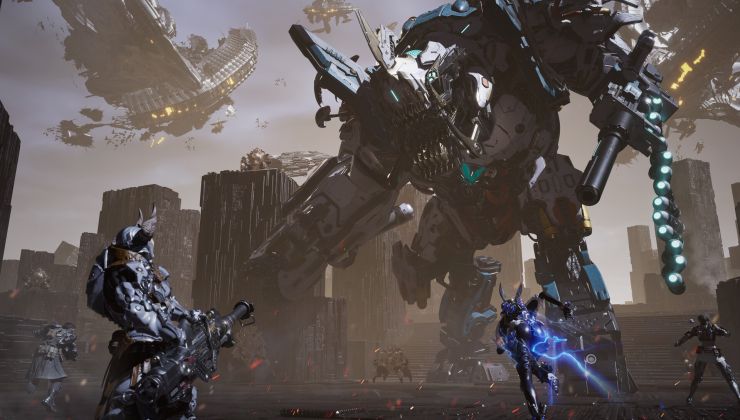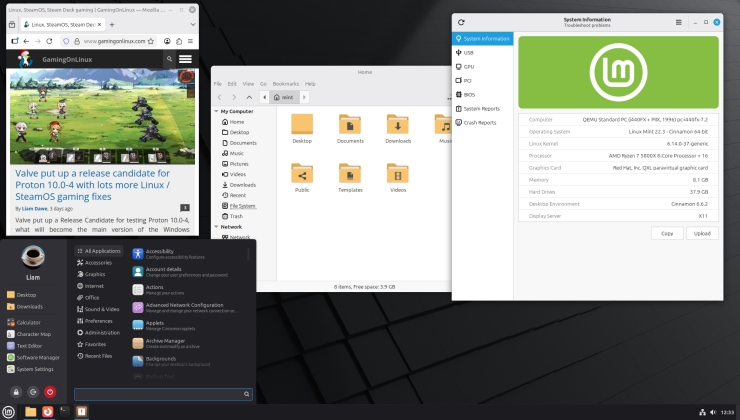The team behind the retro-inspired and Linux-powered gaming box, the Atari VCS, have put out an "Early Summer Update" of what's going on with the project.
It goes over a bunch of details they've already talked about, including how it was shown off a little at E3 this year. They said it felt like "mission accomplished" after other members of the press and partners got to see a little more of it.
Interestingly, they say they've created (from scratch) an Atari 2600 emulator that comes baked into the entire system, giving you easy access to retro games. Apparently, you will be able to fire it up and play some classic games while other bigger games are loading, that sounds somewhat interesting I will admit, but not many games take long enough to load to make that worthwhile.
Atari are planning to add in more games and other 3rd-party console emulators available on the Atari VCS post-launch. So, they really are betting big on nostalgia here but that's nothing new, the whole thing is supposed to be a nostalgia trip right down to the design of the box and the "Classic Joystick" that hurts your hands like hell.
What I am more surprised by, is how they really do seem firmly committed to keeping the device open, which is why they don't particularly like it being called a "console".
Part of this, is that they actually showed off the VCS Sandbox Mode, which allows you to run a different operating system on it during E3. Visitors got a look at Borderlands 2 on the VCS, using Ubuntu in full 1080p resolution. According to them, it ran "fantastically" but Ars weren't impressed by the performance. They also showed Rocket League, Broforce and more running on Ubuntu.
Basically, the Atari VCS is a small traditional computer that comes with their own UI pre-loaded that's built on top of Linux and an Atari 2600 emulator, with nothing stopping you loading your own operating system on it. Sounds very much like what Valve's whole Steam Machine idea could have been, if they had done the hardware in-house and made it less confusing.
Will the Atari VCS do well? Possibly. A nice little unit for those who don't have a lot of space, those that like to tinker, those that appreciate retro games and later perhaps some game streaming. There's a lot of possible opportunities for it, as long as they don't screw it up. I'm keen to see more from it, so I will take a look once it's properly out unless (hello Atari) they send a unit over.
As a little joke (sorry Atari), this is how Thunderbird decided to show their email to me—ouch.
AMD have a embedded Ryzen that is 4c/8t and have a base/boost 2.0/3.6 GHz that would the perfect for this machine, the V1605B. Although I would stick with the V1807B at 3.2/3.8 GHz and a better GPU.
Last edited by M@GOid on 24 Jul 2019 at 1:52 pm UTC
Anyway in a few short months we should see Navi APU's, I do hope for 8core models but possibly that is hopeful thinking (even tho Intel have 8core apus....)
Quoting: GuestLast I looked, this Atari thing, is a bit pricey for what it is.My thoughts precisely. At half the price it would be a no-brainer, although probably not feasible. However at somewhere between that and the actual price, it would certainly be more tempting.
I do like those controllers, though. Even if I never buy the console, I might get myself one of each. The stick would be great for retro-gaming, and the console-style controller (can we even call them “joypads” these days, with all those sticks and things?) looks like a prettier XBox controller. And c'mon... even though Atari isn't really Atari any more, that logo is still the coolest in videogaming. :)
Quoting: GuestPerhaps you're right, If Valve had went something like this for the steam box, it'd prob worked out better.Those licenses need to be paid. It's coming with tons of (old) games, and the shareholders want their money. This kind of product is never going to be as cheap as a bare metal box.
However. This like this Valve's boxes sorta share a common problem, Price. imo
Last I looked, this Atari thing, is a bit pricey for what it is.
Quoting: constObvious hardware choice for today would be a system resembling Stadia as much as possible. AMD could go crazy producing that chipset.Not sure I understand. What system would "resemble" Stadia? And why would it matter? Stadia things "run" in a browser, no? Use anywhere on anything is part of the schtick.
I see several reasons to do this:
1 If hardware is produced in real masses, prices may fall. Having google as a huge customer already lowers the gap. (If manufacturer calculated correctly and can keep up with the demand)
2. potentially increased firmware/driver quality
3. and more important: Games that are ported with stadia in mind will not need that much quality control, as long as the software platform is similar enough. I know that input- and output- handling will be quite different, but this should be easily abstractable. In the end, it would make it an easier decision to release a build not only to Stadia but also to the compatible home console.
Quoting: constIt should resembe Stadia server instances in hardware.Ah, I see. Interesting idea. I can see two possible caveats:
I see several reasons to do this:
1 If hardware is produced in real masses, prices may fall. Having google as a huge customer already lowers the gap. (If manufacturer calculated correctly and can keep up with the demand)
2. potentially increased firmware/driver quality
3. and more important: Games that are ported with stadia in mind will not need that much quality control, as long as the software platform is similar enough. I know that input- and output- handling will be quite different, but this should be easily abstractable. In the end, it would make it an easier decision to release a build not only to Stadia but also to the compatible home console.
1. Stadia servers might be surprisingly varied. Google is leveraging its existing worldwide gajillions of servers, minimizing latency by using a server physically near the customer. No doubt they will be rolling out servers intended specifically for Stadia, but they may not be able to rely on those consistently. So Stadia might be designed to work with a variety of hardware, making builds specialized to work with it less relevant.
2. It's early days yet. Stadia may turn out to be a flop, which would make compatibility with it pointless.
Quoting: TheRiddickHmmm, I thought they upgraded to a vega APU?Its Basically a Athlon 200GE with a 15W TDP. 2 Zen Cores with 4 Threads and 3 Vega CUs.
Anyway in a few short months we should see Navi APU's, I do hope for 8core models but possibly that is hopeful thinking (even tho Intel have 8core apus....)
But they are using a special version called Ryzen embedded V1000 IIRC.
Quoting: Purple Library Guy1. Where should those instances come from? Servers with amd vulkan capable graphics hardware that have an architecture allowing for this are probably pretty rare, even at google. And developers can get a kit that's supposed to represent the final hardware (already as a rig). In the presentation, they specifically said they can cluster their instances for more power (which, in itself, would be a phenomenal feature for a console ^^)Quoting: constIt should resembe Stadia server instances in hardware.Ah, I see. Interesting idea. I can see two possible caveats:
I see several reasons to do this:
1 If hardware is produced in real masses, prices may fall. Having google as a huge customer already lowers the gap. (If manufacturer calculated correctly and can keep up with the demand)
2. potentially increased firmware/driver quality
3. and more important: Games that are ported with stadia in mind will not need that much quality control, as long as the software platform is similar enough. I know that input- and output- handling will be quite different, but this should be easily abstractable. In the end, it would make it an easier decision to release a build not only to Stadia but also to the compatible home console.
1. Stadia servers might be surprisingly varied. Google is leveraging its existing worldwide gajillions of servers, minimizing latency by using a server physically near the customer. No doubt they will be rolling out servers intended specifically for Stadia, but they may not be able to rely on those consistently. So Stadia might be designed to work with a variety of hardware, making builds specialized to work with it less relevant.
2. It's early days yet. Stadia may turn out to be a flop, which would make compatibility with it pointless.
2. It may fail, but not in a matter of months. There are currently quite a lot of big names getting into it and there's momentum to catch. I doubt it will have a huge impact on PC gaming, but unless Valve comes up with something way more user friendly, they will have a niche.
Last edited by const on 24 Jul 2019 at 7:23 pm UTC
Quoting: const...they will have a niche.1)gpus are common for machine learning servers, i think google has an plan B in case stadia flops.
2)if you search for stadia on youtube, you will not find many videos talking good things about it, in terms of marketig, looks like it already failed.
or you are talking about atari?
Quoting: elmapulI think in discussions about gaming platforms, failing is a very vague word. Do I believe a significant percentage of PC gamers will jump to Stadia? No. Do I think their "buy games for stadia at retail prices" idea will stand? No. They will have to adopt this or they are doomed, unless they give an additional download option. But all that doen't necessarily mean it will absolutely flop. For all those people who want to play this "one game" but don't have capable hardware (or OS), Stadia will be an obvious choice and unless their management is totally nuts, they will be abled to monetarize that niche.Quoting: const...they will have a niche.1)gpus are common for machine learning servers, i think google has an plan B in case stadia flops.
2)if you search for stadia on youtube, you will not find many videos talking good things about it, in terms of marketig, looks like it already failed.
or you are talking about atari?
Quoting: constthere is no middle term, its either an total flop or an sucess.Quoting: elmapulI think in discussions about gaming platforms, failing is a very vague word. Do I believe a significant percentage of PC gamers will jump to Stadia? No. Do I think their "buy games for stadia at retail prices" idea will stand? No. They will have to adopt this or they are doomed, unless they give an additional download option. But all that doen't necessarily mean it will absolutely flop. For all those people who want to play this "one game" but don't have capable hardware (or OS), Stadia will be an obvious choice and unless their management is totally nuts, they will be abled to monetarize that niche.Quoting: const...they will have a niche.1)gpus are common for machine learning servers, i think google has an plan B in case stadia flops.
2)if you search for stadia on youtube, you will not find many videos talking good things about it, in terms of marketig, looks like it already failed.
or you are talking about atari?
Quoting: elmapulthere is no middle term, its either an total flop or an sucess.That's where I would always differ. Especially if google have additional jobs for the hardware, as people suggest.
Last edited by const on 25 Jul 2019 at 7:15 pm UTC
Quoting: constha, not sure how the talk about the Atari VCS turned into Google Stadia talk. One is (in theory) going to be similar to Steam, Playstation Store, Xbox Live, vs one is a streaming service, which most of us would never bother with.Quoting: elmapulthere is no middle term, its either an total flop or an sucess.That's where I would always differ. Especially if google have additional jobs for the hardware, as people suggest.
Hell, I don't even like having Chrome installed...
Quoting: slaapliedjeYeah, dislike Chrome, too :)Quoting: constha, not sure how the talk about the Atari VCS turned into Google Stadia talk. One is (in theory) going to be similar to Steam, Playstation Store, Xbox Live, vs one is a streaming service, which most of us would never bother with.Quoting: elmapulthere is no middle term, its either an total flop or an sucess.That's where I would always differ. Especially if google have additional jobs for the hardware, as people suggest.
Hell, I don't even like having Chrome installed...
Quoting: PatolaNo middle term? So how is Linux gaming in all of this?by wich measure 1% of marketshare on the desktop is an middle term?











 How to setup OpenMW for modern Morrowind on Linux / SteamOS and Steam Deck
How to setup OpenMW for modern Morrowind on Linux / SteamOS and Steam Deck How to install Hollow Knight: Silksong mods on Linux, SteamOS and Steam Deck
How to install Hollow Knight: Silksong mods on Linux, SteamOS and Steam Deck